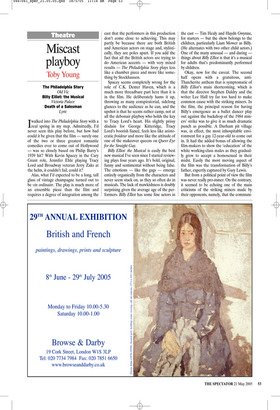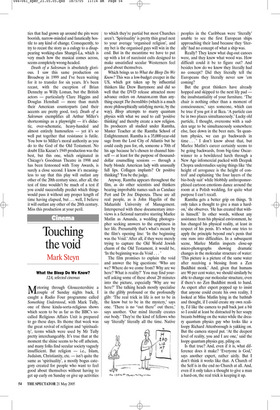Miscast playboy
Toby Young
The Philadelphia Story Old Vic Billy Elliot: the Musical Victoria Palace Death of a Salesman Lyric
Iwalked into The Philadelphia Story with a real spring in my step. Admittedly, I’d never seen this play before, but how bad could it be given that the film — surely one of the two or three greatest romantic comedies ever to come out of Hollywood — was so closely based on Philip Barry’s 1939 hit? With Kevin Spacey in the Cary Grant role, Jennifer Ehle playing Tracy Lord and Broadway veteran Jerry Zaks at the helm, it couldn’t fail, could it?
Alas, what I’d expected to be a long, tall glass of vintage champagne turned out to be vin ordinaire. The play is much more of an ensemble piece than the film and requires a degree of integration among the cast that the performers in this production don’t come close to achieving. This may partly be because there are both British and American actors on stage and, stylistically, they are poles apart. If you add the fact that all the British actors are trying to do American accents — with very mixed results — The Philadelphia Story plays less like a chamber piece and more like something by Stockhausen.
Spacey seems completely wrong for the role of C.K. Dexter Haven, which is a much more threadbare part here than it is in the film. He deliberately hams it up, throwing as many conspiratorial, sidelong glances to the audience as he can, and the upshot is that he seems rather camp, not at all the debonair playboy who holds the key to Tracy Lord’s heart. His slightly prissy disdain for George Kitteridge, Tracy Lord’s boorish fiancé, feels less like aristocratic froideur and more like the attitude of one of the makeover queens on Queer Eye for the Straight Guy.
Billy Elliot: the Musical is easily the best new musical I’ve seen since I started reviewing plays four years ago. It’s bold, original, funny and sentimental without being false. The emotions — like the gags — emerge entirely organically from the characters and never seem stuck on, as they so often do in musicals. The lack of mawkishness is doubly surprising given the average age of the performers. Billy Elliot has some fine actors in the cast — Tim Healy and Haydn Gwynne, for starters — but the show belongs to the children, particularly Liam Mower as Billy. (He alternates with two other child actors.) One of the many unusual — and daring things about Billy Elliot is that it’s a musical for adults that’s predominantly performed by children.
Okay, now for the caveat. The second half opens with a gratuitous, antiThatcherite anthem that is symptomatic of Billy Elliot’s main shortcoming, which is that the director Stephen Daldry and the writer Lee Hall try far too hard to make common cause with the striking miners. In the film, the principal reason for having Billy’s emergence as a ballet dancer play out against the backdrop of the 1984 miners’ strike was to give it as much dramatic punch as possible. A Durham pit village was, in effect, the most inhospitable environment for a gay 12-year-old to come out in. It had the added bonus of allowing the film-makers to show the ‘education’ of the white working-class males as they gradually grew to accept a homosexual in their midst. Easily the most moving aspect of the film was the transformation of Billy’s father, expertly captured by Gary Lewis.
But from a political point of view the film was never really pro-miner. On the contrary, it seemed to be echoing one of the main criticisms of the striking miners made by their opponents, namely, that the communi ties that had grown up around the pits were boorish, narrow-minded and fanatically hostile to any kind of change. Consequently, to try to recast the story as a eulogy to a disappearing working-class Shangri-La, which is very much how the musical comes across, seems completely wrong-headed.
Death of a Salesman is absolutely glorious. I saw this same production on Broadway in 1999 and I’ve been waiting for it to transfer for six years. It’s been recast, with the exception of Brian Dennehy as Willy Loman, but the British actors — particularly Clare Higgins and Douglas Henshall — more than match their American counterparts (and their accents are pretty good, too). Death of a Salesman exemplifies all Arthur Miller’s shortcomings as a playwright — it’s didactic, over-schematic, heavy-handed and almost entirely humourless — yet it’s so well put together that resistance is futile. You bow to Miller’s moral authority as you do to the God of the Old Testament. No doubt Elia Kazan’s 1949 production was the best, but this one, which originated in Chicago’s Goodman Theatre in 1998 and has been festooned with Tony Awards, is surely a close second. I know it’s meaningless to say that this play will outlast any other of the 20th century since, after all, the test of time wouldn’t be much of a test if you could successfully predict which things would pass it without any proper length of time having elapsed, but ... well, I believe it will outlast any other of the 20th century. Miss this production at your peril.


























































 Previous page
Previous page